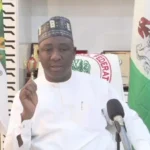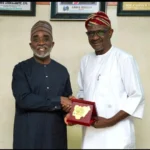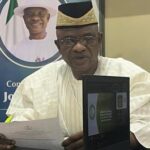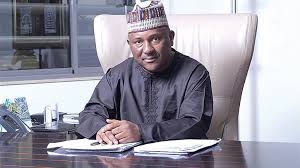By Deborah Coker
Alhaji Abdul Samad-Rabiu, Chairman and Founder, BUA Group, has urged Britain and its Western allies to deepen partnerships and increase investments in Nigeria.
The News Agency of Nigeria (NAN) reports that Samad-Rabiu said this in an opinion piece published in the Telegraph of London, on Saturday.
The philanthropist asserted that President Bola Tinubu’s economic reforms were positioning the country prominently on the global economic map.
He said that Tinubu’s decisive leadership in reforms had cut Nigeria’s official consumption of petrol by 45 per cent.
According to him, as someone who has built multinational businesses across Africa, I know the vast opportunity the continent offers, and Nigeria in particular which alone accounts for a fifth of sub-Saharan Africa’s 1.2 billion people.
“Lowering barriers to trade is crucial, and for that Britain’s ETIP looks prescient.
“However, investment and business potential will remain discounted as long as African nations cling to state intervention from subsidies and price controls to exchange rate distortions all of which have consistently bred dysfunction and economic instability.
“Fortunately, Nigeria has now decisively turned a corner, embracing market economics under a liberalising government.”
He said that the shift in policies by the Tinubu administration had projected Nigeria towards a better future.
“In making that shift, Nigeria is taking the lead for a continent to follow. So many Nigerian administrations I have known have been hostage to economic events, doubling down time and again on state intervention rather than having the conviction to reform.
“This administration is proving different. After two years of difficult reforms, Nigeria under President Bola Tinubu is now poised to fulfil the promise of its vast natural resources, rapidly growing population of over 200 million people, and strategic coastal location along the Gulf of Guinea,” he said.
The BUA founder observed the drastic fall in official consumption of petrol as one of the gains of the reforms saying “First, the Tinubu administration removed a crippling fuel subsidy; the most significant policy reform in years.
“When President Tinubu ditched the fuel subsidy on his first day in office, criticism quickly followed. However, statistics must be understood in light of the wide-ranging distortions the subsidy created.
“But that is not because Nigerians’ petrol use reduced by this amount. In reality the country was subsidising the region, with cross border fuel smugglers profiting from arbitrage.
“The illegal trade was so blatant that on a visit to neighbouring Niger a few years ago, then President Mohamed Bazoum even joked about it, thanking Nigeria for the cheap fuel. Though the move was politically unpopular, the subsidy had become unsustainable.
“Now, spending is being redirected toward development and infrastructure, laying the foundations for long-term growth,” he said.
Samad-Rabiu also said that the country had moved from a fixed to a market-determined exchange rate.
According to him, previously, only select groups could access the official rate especially those with political connections; the rest had to rely on a more expensive parallel informal market determined by supply and demand.
“But selling dollars at an artificially low rate only entrenched scarcity, a problem compounded by an opaque exchange mechanism that deterred foreign investment.
“Every two weeks, we used to make the 12-hour drive to Abuja to seek dollar allocations for imports, camping out at the Central Bank for three or four days.
“Now, I no longer need to go. I’ve met the new Governor only once in two years because I haven’t had to.
“Monetary orthodoxy has finally arrived, bringing with it the liquidity that both domestic and foreign businesses depend on to smooth trade and de-risk investment.”
He further said that the shackles of politics were being prised from business, bringing greater certainty, fairness and stability to the landscape.
“Indeed, many of the benefits of reform are still to be felt by the wider public. But economic fundamentals must be fixed before that becomes possible.
“Now that Nigeria has made it through the toughest phase, its direction should be clear to investors.
“For Britain, the Enhanced Trade and Investment Partnership with Nigeria is a strategic bet on reform, resilience and long-term reward.
“Nigeria is now delivering its part of the bargain. As my country steadies itself, the UK, its Western allies and their companies should deepen this partnership,” he added. (NAN)(www.nannews.ng)
Edited by Sadiya Hamza












